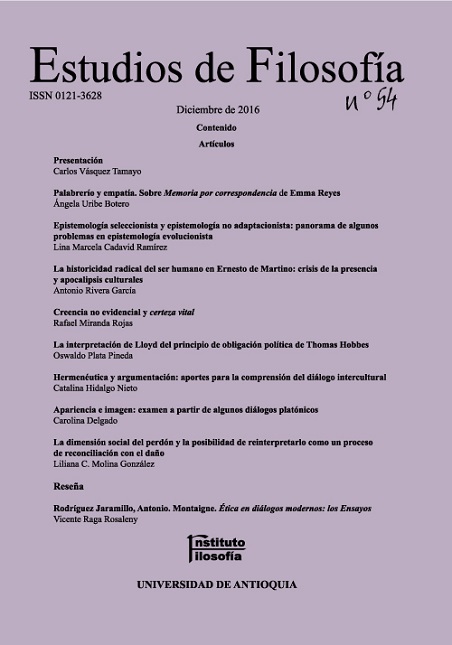Selectionist Epistemology and Non-Adaptationist Epistemology: Outlook of Some Problems in Evolutionary Epistemology
DOI:
https://doi.org/10.17533/udea.ef.n54a03Keywords:
Selectionist Epistemology, Non-adaptionist Epistemology, downward causation, natural selection, organismAbstract
This paper presents some philosophical problems concerning evolutionist epistemology (selectionist epistemology) as an interdisciplinary discourse that seeks to explain the classical issues in the teory of knowledge. In order to develop these problems, it will be necessary to discuss some aspects that have been criticized with regard to the role that evolutionist epistemology has given to natural selection in the process of knowledge. These critiques arise from another theoretical perspective, the non-adaptationist epistemology, as understood by Franz Wuketits. From this discussion between selectionist epistemology and non-adaptationist epistemology, this paper reviews the Donald T. Campbell notion of downward causation and the importance that Wuketits gives to the interaction between organism and environment.
Downloads
References
Abrantes, P. (2007). “El programa de una epistemología evolucionista”, en: Filosofía, darwinismo y evolución. Alejandro Rosas (ed). Bogotá: Universidad Nacional de Colombia, pp. 121-179.
Aranguren, M. (2010). “Análisis crítico del modelo de variación ciega y retención selectiva de la creatividad”, en: Interdisiciplinaria, 27, 2, pp. 315-334.
Buskes, C. (2009). La herencia de Darwin. La evolución en nuestra visión del mundo. Barcelona: Herder.
Campbell, D. T. (1997). “Epistemología evolucionista”, en: Epistemología evolucionista. Martínez F., S. y Olivé, L. (comp.). México: Paidós, pp. 43-103.
Martínez F., S. y Olivé, L. (comp.) (1997). Epistemología evolucionista. México, Paidós.
Campbell & Goldstein (2003). “Downward Causation in Hierarchically Organized Biological System”, en: ECO Issues, vol. 15, n° 3, pp. 139-151.
Capra, F. (1996). La trama de la vida. Una nueva perspectiva de los sistemas vivos. Barcelona: Anagrama.
Gontier, N. (2006). “Introduction to evolutionary epistemology, language and culture, en: Evolutionary Epistemology, Language and Culture: A Non-Adaptationist, Systems Theoretical Approach. Nathalie Gontier, Van Bendegem, Jean Paul and Aerts, Diederiks (eds). Netherlands: Springer, pp. 1-32.
Lorenz, K. (1974). La otra cara del espejo. Barcelona: Plaza & Janés.
Lorenz, K. (1988). La acción de la naturaleza y el destino del hombre. Madrid: Alianza.
Popper, K. (1992). Conocimiento objetivo. Un enfoque evolucionista. Madrid: Tecnos.
Popper, K. (1997). “La selección natural y el surgimiento de la mente”, en: Epistemología evolucionista. Martínez F., S. y Olivé, L. (comp.). México: Paidós, pp. 25-42.
Quine, W.V. (1986). La relatividad ontológica y otros ensayos. Madrid: Tecnos.
Pacho, J. (1995). ¿Naturalizar la razón? Alcances y límites del naturalismo evolucionista. Madrid: Editorial Siglo XXI.
Schaeffer, J. M. (2009). El n de la excepción humana. México: Fondo de cultura económica.
Riedl, R. (1983). Biología del conocimiento. Los fundamentos logenéticos de la razón. España: Labor.
Ursua, N. (1993). Cerebro y conocimiento: un enfoque evolucionista.
Barcelona: Anthropos.
Ursua, N. (2011). “Una necesidad y una posibilidad productiva. El caso de la teoría evolucionista del conocimiento, en: Ludus Vitalis, vol. 19, n° 36, pp. 325-339.
Vollmer, G. (2005). Teoría evolucionista del conocimiento. Granada: Comares.
Wuketits, F. (1989). “La evolución como proceso cognoscitivo: hacia una epistemología evolucionista”, en: Taula, diciembre, n° 12, pp. 49-72.
Wuketits, F. (2006). “Evolutionary Epistemology: The non adaptationist approach”, en: Evolutionary Epistemoloy, Language and Culture: A Non-Adaptationist, Systems Theoretical Approach. Nathalie Gontier, Van Bendegem, Jean Paul and Aerts, Diederiks (eds). Netherlands: Springer, pp. 33-46.
Published
How to Cite
Issue
Section
Categories
License
Copyright (c) 2016 Lina Marcela Cadavid Ramírez

This work is licensed under a Creative Commons Attribution-NonCommercial-ShareAlike 4.0 International License.
Authors who publish with this journal agree to the following terms:
1. The Author retains copyright in the Work, where the term "Work" shall include all digital objects that may result in subsequent electronic publication or distribution.
2. Upon acceptance of the Work, the author shall grant to the Publisher the right of first publication of the Work.
3. The Author shall grant to the Publisher a nonexclusive perpetual right and license to publish, archive, and make accessible the Work in whole or in part in all forms of media now or hereafter known under a Creative Commons Attribution-NoCommercia-ShareAlike (CC BY-NC-SA 4.0), or its equivalent, which, for the avoidance of doubt, allows others to copy, distribute, and transmit the Work under the following conditions: (a) Attribution: Other users must attribute the Work in the manner specified by the author as indicated on the journal Web site;(b) Noncommercial: Other users (including Publisher) may not use this Work for commercial purposes;
4. The Author is able to enter into separate, additional contractual arrangements for the nonexclusive distribution of the journal's published version of the Work (e.g., post it to an institutional repository or publish it in a book), as long as there is provided in the document an acknowledgement of its initial publication in this journal;
5. Authors are permitted, and Estudios de Filosofía promotes, to post online the preprint manuscript of the Work in institutional repositories or on their Websites prior to and during the submission process, as it can lead to productive exchanges, as well as earlier and greater citation of published work (see The Effect of Open Access). Any such posting made before acceptance and publication of the Work is expected be updated upon publication to include a reference to the Estudios de Filosofía's assigned URL to the Article and its final published version in Estudios de Filosofía.















